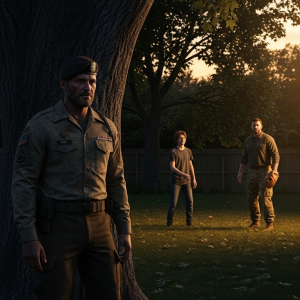In the small, sleepy town of Havenwood, my grandfather, Arthur Pembrook, wasn’t just a man; he was a monument. For forty years, he had been the town sheriff, a figure carved from granite and quiet integrity. Even after his passing, his name was spoken with a reverence usually reserved for founding fathers. To me, Alex, he was simply the hero who taught me how to fish, how to read a compass, and how a good man walks through the world.
Cleaning out his old house on the edge of town felt like a sacred duty. The place smelled of old books, pipe tobacco, and pine cleaner—the scent of my entire childhood. The town had wrapped me in a cocoon of sympathy since the funeral. “Your grandfather was the bedrock of this community,” Mayor Thompson had told me, his hand on my shoulder. “The best man I ever knew.”
Everyone had a story. At the local diner, the waitress, a woman in her sixties, gave me a watery smile. “When I was a girl, my father had a temper. Sheriff Pembrook used to park his car at the end of our street some nights. He never said anything, just sat there. But his being there was enough. He made me feel safe.”
I remembered his quirks, now haloed by nostalgia. His long, solitary “fishing trips” up north, sometimes for days on end, from which he’d return empty-handed but strangely peaceful. His vast network of friends, old cops and army buddies scattered across the country, with whom he’d have hushed, serious phone calls. And his quiet frustration with the very system he’d sworn to uphold. “The law is a net with holes in it, Alex,” he’d told me once, staring out at the setting sun. “Sometimes the worst monsters are small enough to slip right through.” At the time, I thought it was just the weariness of a long career. I didn’t understand it was a confession.
He was always looking out for the town’s kids, especially the ones on the margins. The ones with nervous eyes and clothes that never seemed to fit. He was the one who noticed the “clumsy” kid with the perpetual bruises, or the girl who flinched every time a door slammed. He saw the things the rest of us were too comfortable to see. He was a protector. He was a hero. That was the monument I knew. I had no idea I was about to take a sledgehammer to it.
The attic was a tomb of forgotten things, thick with the dust of sixty years. Sunlight struggled through a single grimy window, illuminating dancing motes of dust. I was prying up a stack of old newspapers from the corner when my crowbar hit something that wasn’t wood. It was a faint, metallic thud.
My curiosity piqued, I pulled away the rotting papers and found it: a section of the floorboards that was subtly different. I worked the crowbar into the seam and lifted. Beneath it, nestled in the dark insulation, was a heavy, rust-pocked iron box. It was locked with a simple, sturdy padlock.
After a trip to the shed and a few sharp blows with a hammer, the lock sprang open. I lifted the heavy lid, a puff of stale air rising to meet me. Inside, on a bed of faded black felt, was a collection of keys. There were at least two dozen of them, each one old and tarnished. And tied to each key with a thin piece of wire was a small, cardboard tag. On each tag, written in my grandfather’s neat, precise hand, was a date.
The first one I picked up read October 12, 1995. Just a random date, I thought. I picked up another. May 3, 2001. And another. July 22, 1989. They were just dates, but an unsettling feeling, a cold and heavy dread, began to pool in my stomach. Why would my grandfather, a man of meticulous order, keep a box of anonymous, dated keys?
Then my eyes landed on one near the bottom. The handwriting was slightly faded, but the date was perfectly clear. August 16, 1999.
My blood ran cold. The breath caught in my throat. I knew that date. Everyone in Havenwood knew that date. It was Sarah Jenkins’s eighth birthday. It was the day she vanished from her own backyard while her parents were inside. The biggest, most tragic mystery the town had ever known. My grandfather had led the search for weeks. I remembered the torment on his face, the exhaustion in his eyes.
My hands trembling, I scrambled out of the attic, clutching the key. I fumbled my laptop open, my mind screaming in denial. I typed “Havenwood missing children” into the search bar. The screen filled with grainy photos and old news articles. My horror mounted as I cross-referenced the dates on the tags with the birthdays of the children who had disappeared without a trace over the last thirty years.
Timothy Gable. Vanished in 1989. His birthday? July 22nd. Michael O’Connell. Disappeared in 2001. His birthday? May 3rd. Every single date on every single tag was a match.
The monument of Arthur Pembrook cracked down the middle. My hero, the town’s protector, the man who comforted the grieving parents, had a secret collection of keys. Keys tied to the birthdays of children who were stolen from their lives. The conclusion was impossible, unthinkable, and utterly unavoidable. The keys had to be trophies. And my grandfather, my hero, was a monster.
The drive to the Havenwood Savings & Loan felt surreal. The sun was shining, people were mowing their lawns, and the world was proceeding with its ordinary business, completely unaware that I was carrying the evidence of a serial predator in a shoebox on my passenger seat. I felt like a ghost, disconnected from the life I had known just hours before.
The keys were for safe deposit boxes. It was the only explanation. I walked into the bank, the cool air-conditioning doing nothing to stop the sweat trickling down my back. I approached the manager, a man who had known my grandfather for years, and explained that I was the executor of Arthur’s estate and had found some old keys. He led me, with solemn respect, down to the vault.
The massive, circular steel door swung open, revealing rows of gleaming metal boxes. The air was cold, still, and silent. It felt like a mausoleum. Using the bank’s master key alongside the first one from my box—Sarah Jenkins’s key—the manager opened box #342. He slid out the long, metal container and discreetly left me alone in a private viewing room.
My heart pounded against my ribs. I lifted the lid. Inside, there was no gruesome evidence, no smoking gun. There was only a single item: a worn, one-eyed teddy bear. Its fur was matted, a clear sign it had been clutched by a child for years. It was Sarah’s. I remembered seeing it on the news posters, a picture of her hugging it tightly. This was her beloved “Barnaby.”
A wave of nausea washed over me. This was worse than I could have imagined. This was intimate. It was proof of a deep, personal connection to the crime. I moved to the next box, Timothy Gable’s. Inside was a scuffed Little League baseball medal, the blue ribbon faded with time. The next box held a diary filled with childish handwriting and drawings of horses. Each box held a piece of a stolen childhood, a final, sacred object taken from a life that had been extinguished.
With each box I opened, the image of my grandfather warped into something more and more hideous. The kind, gentle man was gone, replaced by a calculating, cold-blooded predator who had lived a double life, collecting relics of his unspeakable acts. I imagined him, after each disappearance, coming here to this cold, silent room, to look at his trophies and relive his dark triumphs.
I felt a volcanic rage building inside me, a rage at the man who had fooled me, who had fooled the entire town. I was his blood, his legacy. And his legacy was a lie, built on the bones of missing children. By the time I reached the final, largest box, I was no longer grieving a hero. I was preparing to unearth the last secrets of a villain.
The last box was heavier. I slid it from its slot, my hands slick with sweat. I expected the worst, some final, horrific memento. But when I opened it, there was no toy, no piece of clothing. There was only a thick, leather-bound ledger, the kind accountants used decades ago. Its pages were filled with my grandfather’s precise, familiar script.
But it was in code. A mix of numbers and letters. My despair deepened. It was a cipher, designed to keep his monstrous secrets safe forever. I almost slammed it shut, but then I noticed the pattern. The numbers were police codes, the ten-codes he had taught me when I was a kid, playing “cops and robbers” in the backyard. 10-4 was “okay,” 10-20 was “location.” And the letters… it was a simple substitution cipher, the key being a phrase he used to say all the time: “Justice for all.”
My fingers flew across the notepad I’d brought, my mind racing as I translated the first entry. The room, the world, seemed to fade away as the true meaning of the words began to materialize on the page.
“Case #01: S.J. (Sarah Jenkins). DOB: 08/16/1991. Official Status: Missing. Actual Status: Liberated 08/16/1999. Circumstances: Chronic neglect, evidence of physical abuse (father). Multiple reports filed by school, all dismissed by family court judge friendly with the family. Child exhibited extreme fear response. System failed. Action: Extraction facilitated during birthday party. Relocated with vetted foster family (retired teacher, approved) in Ontario, Canada via ‘fishing trip’ network. New Identity: Emily Grace Foster. Memento: Teddy Bear ‘Barnaby’, surrendered willingly as ‘last piece of the old life’.”
I stopped, my pen falling from my numb fingers. I read it again, and then a third time. Liberated. System failed. New Identity. It wasn’t a confession of murder. It was a mission report.
I frantically turned the page and began decoding the next entry.
“Case #02: T.G. (Timothy Gable). DOB: 07/22/1981. Official Status: Missing. Actual Status: Liberated 11/04/1989. Circumstances: Extreme physical abuse (stepfather). Child treated at ER for ‘fall down the stairs’ twice in one year. My official investigation was stonewalled. Imminent danger suspected. Action: Extraction from school bus stop. Relocated with uncle (ex-Marine, vetted) in Oregon. New Identity: Daniel Markson. Memento: Baseball medal, his one source of pride.”
Page after page, the story was the same. Each entry detailed a child living in a private hell, a world of pain and fear hidden behind the closed doors of Havenwood’s quiet streets. It detailed every way the official system—the courts, the social workers, the law he represented—had failed to protect them. And then it detailed his solution. An underground railroad for the lost children of his town.
The keys were not trophies of crimes, but keys to safe havens. The mementos were not souvenirs of a predator, but relics of lives he had saved, given to him by the children themselves as they stepped into their new futures. The fishing trips, the network of old friends, his cynicism about the law—it all slammed into place. The monument I had destroyed was a fiction. The monster I had imagined was a lie. The truth was impossibly, terrifyingly, and magnificently more complex. My grandfather was no monster. He was a vigilante. A savior who operated in the dark, breaking the law in the name of a justice the law could not provide.
I sat in that silent, sterile room for hours, the open ledger on my lap, the weight of two dozen secret lives pressing down on me. The destruction of my grandfather’s image was now complete, but this final form was the most difficult to comprehend. He was a lawbreaker. A kidnapper. A hero. How could all those things exist in one man?
My moral compass, the one he himself had helped me build, was spinning wildly. The right thing to do, the legal thing, was to go to the police. To lay this all out. But what would that accomplish? It would shatter the legacy of a good man, brand him a criminal in the history books. Far worse, it would unleash a hurricane into the lives of the people he had saved. These “missing children” were now adults, doctors, parents, artists, living full and happy lives under new names. Exposing this secret would mean dragging them back into the trauma they had escaped, destroying the peace my grandfather had risked everything to give them.
And for what? To uphold a system that had already failed them? To enforce laws that had proven to be nets with holes in them, just as he’d said?
The choice became clear. True justice wasn’t about the letter of the law; it was about the spirit of protection. His methods were illegal, but his cause was righteous. I closed the ledger and returned it, along with all the mementos, to their boxes. I would guard his secret as fiercely as he had guarded those children.
But keeping the secret was not enough. His work, his true work, had to continue. I used the inheritance he left me to establish a foundation. I called it “Arthur’s Watch.” It provides free legal services, emergency housing, and therapy for children in abusive homes—everything my grandfather had to bypass the system to achieve, we would now do within it, armed with his resources and his fierce determination.
Last month, I took a trip to Portland, Oregon. I found a man named Daniel Markson, a successful architect with a wife and two smiling kids. One afternoon, I anonymously left a small, padded envelope on his desk. Inside was a faded blue ribbon attached to a scuffed baseball medal, and a simple, unsigned, typewritten note.
It said only: “He wanted you to know you were never forgotten. You were a hero who deserved a safe harbor. He was proud of the man you became.”
I didn’t stay to see his reaction. I didn’t need to. Driving away, I finally understood the full weight of my grandfather’s legacy. It wasn’t in the plaques at the town hall or the reverent stories told at the diner. It was in the quiet, happy lives of the children who had “vanished.” I had not only found the truth about my grandfather; I had found my own purpose. I was the new watchman, the heir to his sacred, silent post.




